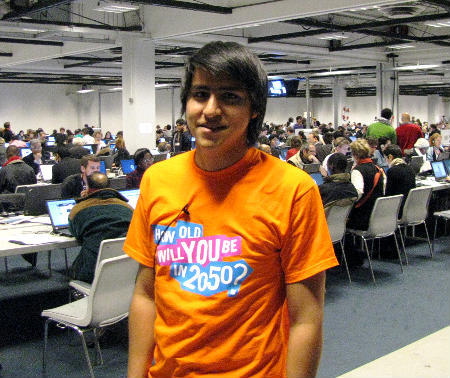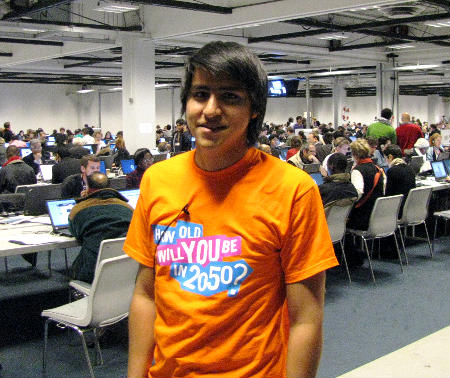COPENHAGEN—The anger in Juan Carlos Soriano’s voice was clear when he rose to a podium in the Bella Center Friday afternoon. And it was easy to understand why: the climate-treaty talks were (and still are at this writing) stuck between competing draft texts, none of which offer plans to keep global warming within safe scientific limits.
 “A lot of people realize that as our movement grows we can put more pressure on our own leaders in the U.S. in Latin America, in Africa,” said Soriano.Jon Hiskes / GristAnother reason: Of the more-than 1,500 youth advocates accredited for the conference, all but 12 were locked out of the Bella Center on Friday—because of space constraints, according to the United Nations. Only one of them got to address delegates in the main plenary hall–Soriano, a 23-year-old college student from Peru. He gave voice to the frustration of those on the outside:
“A lot of people realize that as our movement grows we can put more pressure on our own leaders in the U.S. in Latin America, in Africa,” said Soriano.Jon Hiskes / GristAnother reason: Of the more-than 1,500 youth advocates accredited for the conference, all but 12 were locked out of the Bella Center on Friday—because of space constraints, according to the United Nations. Only one of them got to address delegates in the main plenary hall–Soriano, a 23-year-old college student from Peru. He gave voice to the frustration of those on the outside:
“We have all worked for the past two years for the promise of a strong deal in Copenhagen to safeguard our future,” he said. “Now it seems you will not get it done. This is unacceptable. We placed our trust in you. You should be ashamed.”
The outcome of the negotiations remains unclear and they could well slog on into the weekend. It’s also too early to know what Copenhagen means for the climate-change youth movement—the young adults trying to wrest control of the ecological future from the worlds power-brokers. If this proves to be a coming-of-age moment for the movement, if it emerges bigger, louder, and better organized next year, well, that would be a significant outcome from Copenhagen too.
At the opening session of the climate talks two weeks ago, Christina Ora, a 17-year-old from the Solomon Islands, told the assembled delegates, “I was born in 1992. You have been negotiating all my life. You cannot tell us that you need more time.”
Over the next two weeks, young citizens marched with tens of thousands of others on Saturday.
They staged demonstrations on behalf of tiny island nations. Some fasted, skipped classes, and tried to hide overnight in the Bella Center to work around the UN access restrictions.
After Soriano’s speech, I asked him about the next steps.
“We’re going to continue working and we’re going to continue putting pressure on them,” he said. “A lot of people realize that as our movement grows we can put more pressure on our own leaders in the U.S. in Latin America, in Africa.”
Soriano grew up in Lima, but spent summers at his grandmother’s home in the Andes Mountains, he said. That’s where he learned about receding glaciers that threatened the country’s water supply and its agriculture and tourism industries. He began working on climate projects at College of the Atlantic in Maine, where he’s a third-year student studying human ecology. He’s in Copenhagen with the group SustainUS and he’d like to return to Peru after graduation to work in environmental policy, he said.
He figured Copenhagen would teach organizers the need to get involved sooner. “We realize that every single one of us has to start bring people together at the local and national levels if we want to influence the international process,” he said. “Our heads of state here came with the positions of what they feel is the majority of their population. In Peru, our position would probably be more progressive if we had a stronger voice from civil society, pushing our government to take leadership on environmental issues. The same thing could be said for the United States.”
It’s tough to know what to make of all that. How much hope to place in social movements—that’s always the question, isn’t it? Rumors are flying around the Bella Center right now—Obama’s about to give a press conference, Obama’s leaving without a deal, the hot dog counter just closed down. It still seems significant that for every promise from a politician in Copenhagen, the youth delegation offers its own vow.
“There will be no decisions about us, without us,” Soriano told the delegates. “Rest assured that we will keep on working, and we will keep on pushing you harder and harder, until the deal is sealed.”
Check out our comprehensive coverage of what the føck is going on in Copenhagen, or track the latest from Grist on our Facebook page or the @grist Twitter feed.





